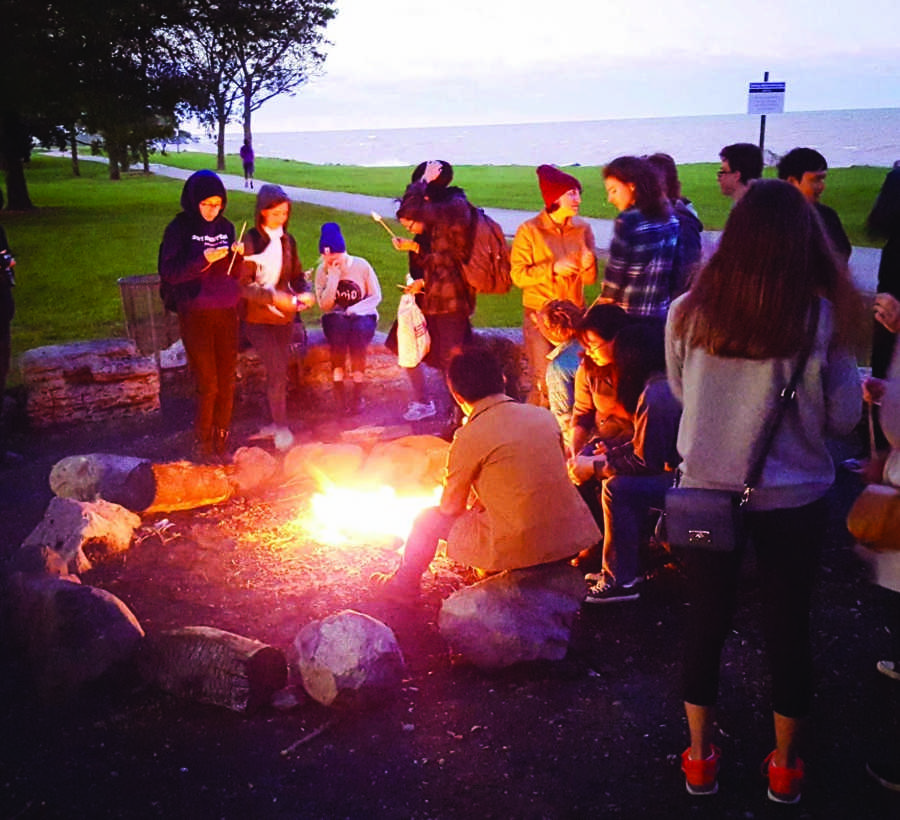Real Food at NU starts placing educational banners in dining halls
Sophie Mann/ Daily Senior Staffer
Students gather at the bonfire held by Real Food at NU on Wednesday evening at the lakefill. The organization started posting banners promoting “local, sustainable, humane or fair trade” food in all dining halls.
October 1, 2015
Real Food at Northwestern University has begun posting banners promoting “local, sustainable, humane or fair trade” food in all dining halls as part of an initiative approved by University President Morton Schapiro last June.
First posted in Sargent, these banners for NURF’s “Real Food Campus Challenge Commitment” are sponsored by Northwestern Dining and were developed by Real Food Challenge, a national organization aiming to unite students nationwide in an effort to promote sustainable and responsible food choices.
“The purpose of the signs is twofold,” Miranda Cawley, Medill senior and NURF co-president, said. “(They’re meant) to get conversation started … and also to advertise the efforts we are currently undertaking with Sodexo, which is to reach our goal of 20 percent ‘real food’ by 2020.”
NURF co-president Kara Rodby said NURF plans to distribute these signs to the rest of NU’s dining halls throughout this quarter and hopes to put up additional banners featuring Northwestern’s progress by Winter Quarter.
“The signs that we have posted … (are) a really good way to introduce people to all facets of our food system and how they’re all interconnected,” the McCormick junior said.
SESP junior Christina Cilento, ASG Vice President for Sustainability, said NU is the first Big Ten school to sign off on the “Real Food Campus Challenge Commitment” and remains one of the largest universities nationwide to have done so.
“This is really indicative of the effective lobbying and relationship building NURF has with the university before them,” said Cilento. “It kind of presents NU as a leader amongst our peers in terms of sustainability and food justice.”
Regardless of this, the topics that NURF seeks to confront both on and off campus are ones that cannot be as easily promoted, Cawley said.
“The whole point of the food wheel, the whole point of this educational campaign is that this food system is so complex and encompasses so many different parts of our lives,” said Cawley.
She went on to emphasize that NURF as a collective does not merely focus on one singular issue. Ultimately, NURF attempts to generate discourse and to educate the community on a variety of nuanced matters, such as those pertaining to the environment, economy and social justice, Cawley said.
“A challenge in our educational efforts is to really lay out what is going on here in a way that is powerful and easily packaged for public relations consumption,” Cawley said.
Cawley said students aren’t usually aware of the issues NURF targets until they have to start feeding themselves.
“This is an opportunity for these students to be able to really take charge of their eating power and get some real food in their dining halls,” she said.
As of now, students such as Cilento, who lives off-campus, are taking note of the collective changes NURF and NU Dining have made to their sustainability marketing platforms.
“It’s something that a lot of people can easily get behind … and everyone wants better quality dining hall food,” said Cilento. “Even if students don’t recognize them, the fact that (the signs) are still there is still a win in and of itself.”
Email: [email protected]
Twitter: @kara_stevick


